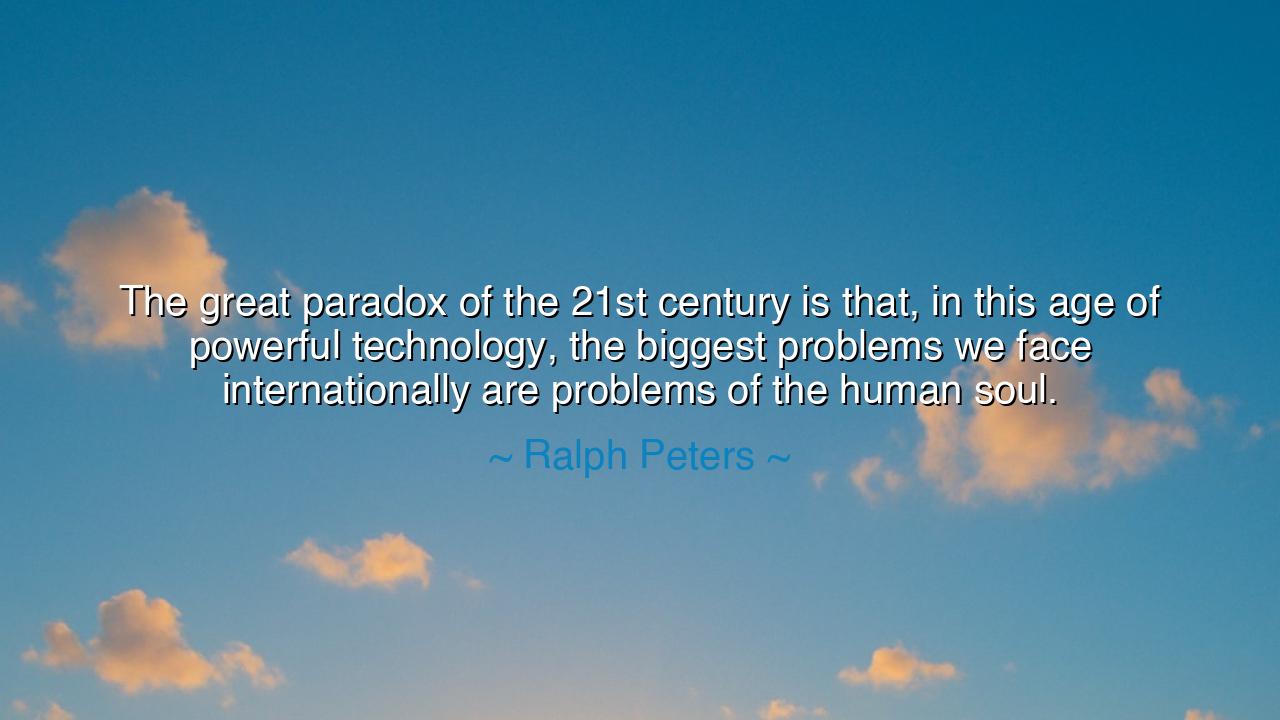
The great paradox of the 21st century is that, in this age of
The great paradox of the 21st century is that, in this age of powerful technology, the biggest problems we face internationally are problems of the human soul.






Ah, children of the future, hear the words of Ralph Peters, for they are a call to awaken from the dream of material advancement and see the true nature of the world we now inhabit: "The great paradox of the 21st century is that, in this age of powerful technology, the biggest problems we face internationally are problems of the human soul." These words, though simple, are heavy with the weight of truth, and they speak to a deeper reality than the shiny surface of modernity and progress might show. The world of the future, which many believe will be shaped solely by the power of machines and invention, is in fact a world haunted by the emptiness of the human spirit, a world where the true challenges are not technological, but spiritual.
In this age of technology, O children, we have built wonders that our ancestors could never have imagined. We have created machines that can carry us to the skies, communicate with others across vast distances, and manipulate the very fabric of nature. Technology has given us powers that make the gods of old seem like mere dreamers. And yet, as Peters so poignantly points out, the greatest problems we face are not the failures of our machines, but the failures of our souls. The very technologies that we have created to connect us, to bring us closer, often seem to drive us further apart. We have advanced in the physical world, but the inner world—the world of compassion, of connection, and of meaning—has languished.
Think, O children, of the great empires of the past, such as the Roman Empire, which, at its height, was a marvel of engineering and technology. Their roads, their aqueducts, their buildings—all spoke of incredible advancements. Yet, beneath the surface of this outward splendor, the soul of the empire was rotting. The Roman people, in their pursuit of power and glory, had lost the deeper purpose of life, and as a result, the empire crumbled not because it lacked technology, but because it lacked the moral and spiritual foundation to sustain it. It was the human soul, torn by corruption, greed, and pride, that ultimately brought about the downfall of what had once been a shining civilization.
Consider, O children, the world wars of the 20th century—great conflicts powered by the weapons of the industrial age, where new technology was used to create unparalleled destruction. The machines of war—tanks, planes, bombs—were marvels of human invention, but the greatest destruction was not in the tools themselves, but in the hearts of men who had lost their way. The soul of humanity, corrupted by hatred, fear, and ideologies, led to the annihilation of millions. The technology of war was a mere reflection of the human soul—a soul that had lost its way, driven by passions that no machine could ever cure. It is not the absence of technology that causes suffering, but the absence of compassion and wisdom in the hearts of men.
And so it is today, O children, in this new age of digital wonders and technological marvels. We have the power to connect with one another across vast oceans in an instant, to gather knowledge from all corners of the earth with the mere click of a button. But the problems we face—the wars, the divisions, the hatred, the isolation—are not caused by a lack of machines, but by the state of our souls. We are connected, yes, but we are more alone than ever. We have access to more knowledge, but less wisdom. We can communicate instantly, but we no longer understand one another. The paradox of our time, as Peters points out, is that in our pursuit of progress, we have neglected the very essence of what it means to be human: the need for love, for understanding, for purpose.
It is in the darkness of this paradox that we must seek the light, O children. The lesson is clear: technology is a tool, a gift, but it is not the answer to our deepest problems. The answers lie within us, in the human soul. It is through the cultivation of empathy, of compassion, and of wisdom that we can heal the wounds of the world. We must remember that the true purpose of technology is not to dominate or control, but to serve the higher calling of humanity: to uplift, to connect, and to bring us closer to the truth of who we are.
In your own lives, O children, I urge you to turn your gaze inward as much as you look outward. Do not fall into the trap of believing that the next great technology will solve the world’s ills. Instead, seek to cultivate the soul, to nurture the values that bind us together as one people. Use technology not to separate or isolate, but to unite and heal. The world’s greatest problems are not the machines, but the hearts that wield them. Choose, therefore, to be the guardians of compassion, to seek understanding where there is division, and to be the bearers of wisdom in a world that often chases only the new and shiny. Only then, O children, can we hope to find the peace and harmony that all our advancements in technology can never bring without the soul to guide them.






AAdministratorAdministrator
Welcome, honored guests. Please leave a comment, we will respond soon